Sanjuro Blu-ray Movie
HomeSanjuro Blu-ray Movie 
椿三十郎 / Tsubaki Sanjűr˘Criterion | 1962 | 96 min | Not rated | Mar 23, 2010
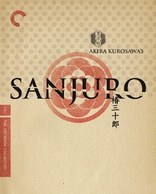
Movie rating
8 | / 10 |
Blu-ray rating
| Users | 4.5 | |
| Reviewer | 4.0 | |
| Overall | 4.1 |
Overview
Sanjuro (1962)
Jaded samurai Sanjuro helps an idealistic group of young warriors weed out their clan's evil influences, and in the process turns their image of a "proper" samurai on its ear.
Starring: Toshir˘ Mifune, Tatsuya Nakadai, Keiju Kobayashi, Yűz˘ Kayama, Reiko DanDirector: Akira Kurosawa
| Foreign | Uncertain |
| Drama | Uncertain |
| Period | Uncertain |
| Martial arts | Uncertain |
| Crime | Uncertain |
| Thriller | Uncertain |
| Action | Uncertain |
Specifications
Video
Video codec: MPEG-4 AVC
Video resolution: 1080p
Aspect ratio: 2.35:1
Original aspect ratio: 2.35:1
Audio
Japanese: LPCM Mono (48kHz, 24-bit)
Japanese: DTS-HD Master Audio 3.0
Subtitles
English
Discs
50GB Blu-ray Disc
Single disc (1 BD)
Playback
Region A (locked)
Review
Rating summary
| Movie | 4.0 | |
| Video | 4.0 | |
| Audio | 4.5 | |
| Extras | 3.0 | |
| Overall | 4.0 |
Sanjuro Blu-ray Movie Review
Reviewed by Dr. Svet Atanasov March 4, 2010Akira Kurosawa's "Sanjuro" (1962) arrives on Blu-ray courtesy of Criterion. The supplemental features on the disc include an exclusive audio commentary with film historian Stephen Prince; a thirty-five-minute documentary about the making of "Sanjuro"; theatrical trailer; and more. The Blu-ray disc also arrives with a 20-page illustrated booklet, containing a statement by Akira Kurosawa that appeared in the 1999 book The Films of Akira Kurosawa, by Donald Richie; Michael Sragow's essay "Return of the Ronin"; and comments from notable Kurosawa collaborators that appeared first in the 2002 Toho DVD release of Sanjuro. With optional English subtitles. Region-A "locked".
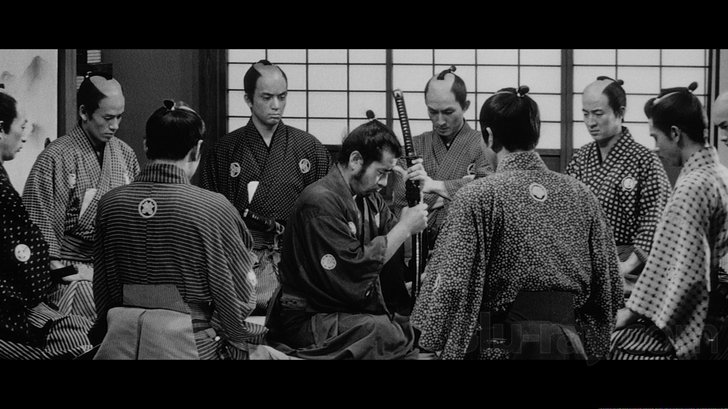
The best sword is kept in his sheath
After the unprecedented success of Yojimbo at the box office in Japan, Toho approached Akira Kurosawa with a request for a sequel. Initially, the film was going to be an adaptation of a novel by Shugoro Yamamoto titled Peaceful Days and featuring a not so skillful with his sword samurai named Hirano, but Kurosawa rewrote the script and brought back the charismatic Sanjuro. Toshiro Mifune was again asked to play Sanjuro, though this time around his last name was changed from Kuwabatake to Tsubaki.
In the original script, Hirano was placed in the middle of an internal battle for power at his clan. Also, he was only to react to the turbulent events around him, not direct them. In the new script, Kurosawa made Sanjuro a confident man, well aware of his opponentsĺ moves. And as it was the case in Yojimbo, Sanjuro was again very impressive with his sword.
But there are some key differences between Yojimbo and Sanjuro. In Yojimbo, all of the drama takes place in a godforsaken small town that has essentially collapsed because of the battle for dominance between two rivaling gangs. When Sanjuro appears, the damage is already done and the only thing he could do is punish those who are responsible for it.
In Sanjuro, the drama and its progression are different. In and around the shrine where most of the film takes place, there is a sense of order that is completely missing in Yojimbo. Here, respect and loyalty still mean something. The men Sanjuro fights are also as noble as he is.
This is not to say, however, that Kurosawa is not as critical in Sanjuro as he is in Yojimbo. While Sanjuro is the quieter and more intimate of the two films, and a lot of the humor in it is far more straightforward, Kurosawaĺs jabs at traditionalism are at times far more effective. For example, some of the most entertaining sequences feature young warriors who are scolded for their blind loyalty and readiness to sacrifice their lives in the name of questionable ideals.
Kurosawa films Sanjuro differently, too. In Yojimbo he is a man that exudes power and respect, even when he makes it perfectly clear that money is what makes him happy. In Sanjuro, he is smarter than his opponents, but his presence is not as commanding. At times, Kurosawa even makes him look foolish. In a key sequence, for instance, Sanjuro loses a small argument with the wife of the man he is trying to save -- discussing camellias of all things -- and Kurosawa uses his embarrassment to make it clear that no one is perfect.
Yojimbo and Sanjuro are equally great looking films, though in different ways. Yojimbo has some remarkable panoramic vistas radiating a strong epic feel. It is also the more modern, at least as far as the then-current state of Japanese cinema is concerned, looking film. Sanjuro has a more traditional look, even though it retains many of the same tightly framed shots Kurosawa favored in Yojimbo.
Like Yojimbo, Sanjuro also benefits from a dynamic music score courtesy of legendary composer Masaru Sato. The score continuously blends traditional Japanese themes and colorful jazz harmonies. (Many of Seijun Suzuki's crime films do the same but with a notably greater enthusiasm to create and maintain their desired atmosphere).
Note: In 2007, Japanese director Yoshimitsu Morita did a remake of Kurosawaĺs Sanjuro, but the film failed to impress the critics and was greeted with a healthy dose of disdain by fans of the original samurai film.
Sanjuro Blu-ray Movie, Video Quality 
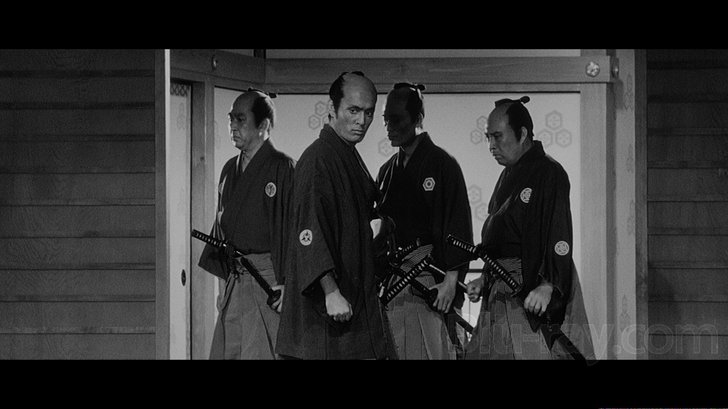
Presented in its original aspect ratio of 2.35:1, encoded with MPEG-4 AVC and granted a 1080p transfer, Akira Kurosawa's Sanjuro arrives on Blu-ray courtesy of Criterion.
Even though the transition to 1080p here is not as striking as it is with Yojimbo, the final result is still pleasing. Again, fine object detail is a lot more convincing, clarity improved and contrast levels much more appealing. Film grain is present, but there are certain areas of Sanjuro where minor noise reduction has been applied. Selected scenes also tend to look slightly softer, but I have to assume that there are specific limitations with the element Criterion had to work with that are actually causing the imbalance.
Edge-enhancement and macroblocking do not appear to be a serious issue of concern. Additionally, I must point out that the digital noise that plagued the DVD release of Sanjuro has been largely eliminated here (with the Blu-ray release of Yojimbo the results are even more impressive). Also, aside from some mild background flickering, the transfer is pleasingly stable. Finally, there are no large cuts, warps, or stains that I saw while viewing the film. To sum it all up, I think that this is a very competent presentation of Sanjuro, which its fans would be delighted with. (Note: This is a Region-A "locked" Blu-ray disc. Therefore, you must have a native Region-A or Region-Free player in order to access its content).
Sanjuro Blu-ray Movie, Audio Quality 
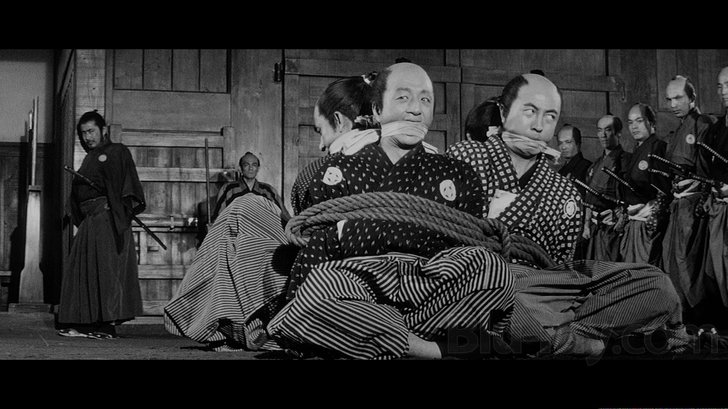
There are two audio tracks on this Blu-ray disc: Japanese DTS-HD Master Audio 3.0 and Japanese LPCM 1.0. For the record, Criterion have provided optional English subtitles for the main feature. When turned on, they appear inside the image frame.
The following text appears in the booklet provided with this Blu-ray disc: "The monaural soundtrack was remastered at 24-bit from the 35mm optical soundtrack. The restored Perspecta Stereophonic Sound was decoded through Perspecta decoder and reencoded as a Dolby 3.0 soundtrack. Clicks, thumps, hiss, and hum were manually removed using Pro Tools HD. Crackle was attenuated using AudioCube's integrated audio workstation."
Once again, I opted for the Japanese LPCM 1.0 track. Generally speaking, the dialog is clean and easy to follow, though I did notice that if you turn up the volume a lot, you would hear some very mild background hissing. Masaru Sato's music score is well balanced with the dialog, and dynamically actually a lot stronger than I expected it to be. I have a feeling, however, that many of you would probably opt for the DTS-HD Master Audio Perspecta 3.0 as it offers some slightly stronger audio enhancements.
Sanjuro Blu-ray Movie, Special Features and Extras 
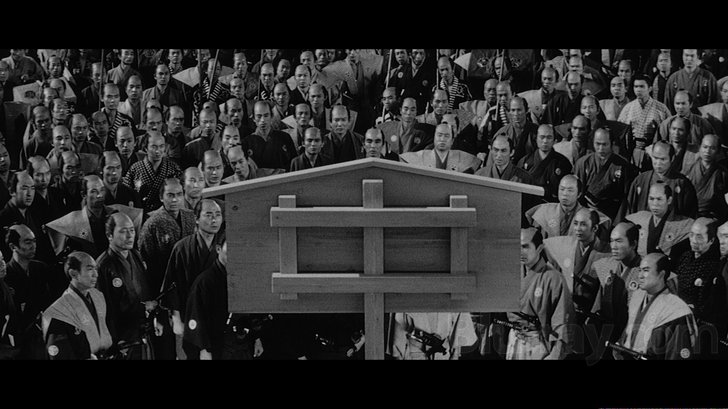
Akira Kurosawa: It Is Wonderful to Create - this thirty-five-minute documentary about the making of Sanjuro, part of the Toho Masterworks series Akira Kurosawa: It Is Wonderful to Create, features director Akira Kurosawa, actor Tatsuya Nakadai, production designer Yoshiro Muraki, and cinematographer Takao Saito, among others. In Japanese, with optional English subtitles. (35 min, 1080i).
Theatrical trailer - In Japanese, with optional English subtitles. (3 min, 1080i).
Teaser - In Japanese, with optional English subtitles. (1 min, 1080i).
Stills gallery - a collection of stills from the filming of Sanjuro.
Commentary - an audio commentary with film historian Stephen Prince, author of The Warrior's Camera: The Cinema of Akira Kurosawa, recorded exclusively for the Criterion Collection in 2006. Once again, this is a very informative, if a bit dry, commentary in which Mr. Prince discusses the similarities and differences between Sanjuro and Yojimbo, Akira Kurosawa's filming technique, the message each film conveys, how they were greeted by the critics and audiences in Japan and around the world, etc.
Booklet - a 20-page illustrated booklet, containing a statement by Akira Kurosawa that appeared in the 1999 book The Films of Akira Kurosawa, by Donald Richie; Michael Sragow's essay "Return of the Ronin" (the author has been writing about new movies for the Baltimore Sun since 2001 and old movies for the New Yorker since 1989); and comments from notable Kurosawa collaborators that appeared first in the 2002 Toho DVD release of Sanjuro.
Sanjuro Blu-ray Movie, Overall Score and Recommendation 
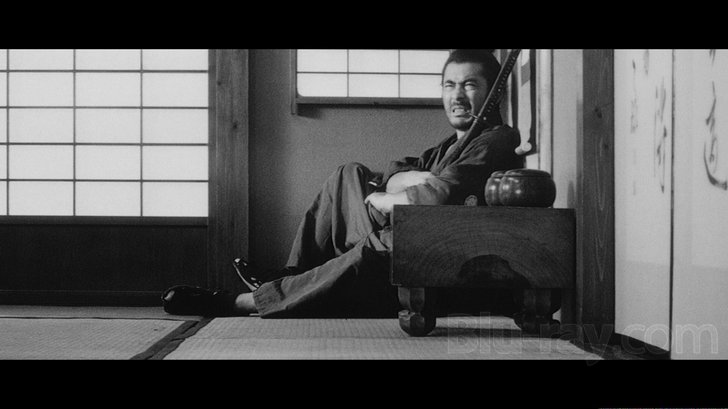
Having seen now what Criterion have done with Akira Kurosawa's Yojimbo and Sanjuro, I can hardly contain my excitement for the big one, Seven Samurai. I am very confident that it will look and sound spectacular on Blu-ray. We just need to be patient, as it is more than obvious that the right people will be releasing it. In the meantime, enjoy Yojimbo and Sanjuro, as both look great on Blu-ray. VERY HIGHLY RECOMMENDED.
Similar titles
Similar titles you might also like

Yojimbo
用心棒 / Y˘jinb˘
1961

High and Low 4K
天国と地獄 / Tengoku to jigoku
1963

Seven Samurai 4K
七人の侍 / Shichinin no samurai
1954

Throne of Blood
蜘蛛巣城 / Kumonosu-j˘
1957

Rashomon
羅生門 / Rash˘mon
1950

The Sword of Doom
大菩薩峠 / Dai-bosatsu t˘ge
1966

Lady Snowblood
修羅雪姫 / Shurayukihime
1973

Harakiri
切腹 / Seppuku
1962

Lone Wolf and Cub: White Heaven in Hell
子連れ狼 地獄へ行くぞ!大五郎 / Kozure ďkami: Jigoku e ikuzo! Daigor˘
1974

Lone Wolf and Cub: Baby Cart at the River Styx
子連れ狼 三途の川の乳母車 / Kozure ďkami: Sanzu no kawa no ubaguruma
1972

Le Cercle Rouge 4K
Uncut Version | includes remastered BD
1970

Lone Wolf and Cub: Sword of Vengeance
子連れ狼 子を貸し腕貸しつかまつる / Kozure ďkami: Ko wo kashi ude kashi tsukamatsuru
1972

Lady Snowblood 2: Love Song of Vengeance
修羅雪姫 怨み恋歌 / Shurayuki-hime: Urami koiuta
1974

Revanche
2008

Zatoichi in Desperation
新座頭市物語・折れた杖 / Shin Zat˘ichi monogatari: Oreta tsue
1972

Zatoichi at Large
座頭市御用旅 / Zat˘ichi goy˘-tabi
1972

Zatoichi the Outlaw
座頭市牢破り / Zat˘ichi r˘yaburi
1967

Zatoichi Goes to the Fire Festival
座頭市あばれ火祭り / Zat˘ichi abare-himatsuri
1970

Zatoichi Challenged
座頭市血煙り街道 / Zat˘ichi chikemuri kaid˘
1967

Samurai II: Duel at Ichijoji Temple
続宮本武蔵 一乗寺の決闘 / Zoku Miyamoto Musashi: Ichij˘ji no kett˘
1955
